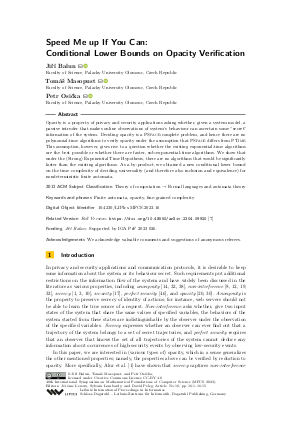@InProceedings{balun_et_al:LIPIcs.MFCS.2023.16,
author = {Balun, Ji\v{r}{\'\i} and Masopust, Tom\'{a}\v{s} and Osi\v{c}ka, Petr},
title = {{Speed Me up If You Can: Conditional Lower Bounds on Opacity Verification}},
booktitle = {48th International Symposium on Mathematical Foundations of Computer Science (MFCS 2023)},
pages = {16:1--16:15},
series = {Leibniz International Proceedings in Informatics (LIPIcs)},
ISBN = {978-3-95977-292-1},
ISSN = {1868-8969},
year = {2023},
volume = {272},
editor = {Leroux, J\'{e}r\^{o}me and Lombardy, Sylvain and Peleg, David},
publisher = {Schloss Dagstuhl -- Leibniz-Zentrum f{\"u}r Informatik},
address = {Dagstuhl, Germany},
URL = {https://drops.dagstuhl.de/entities/document/10.4230/LIPIcs.MFCS.2023.16},
URN = {urn:nbn:de:0030-drops-185504},
doi = {10.4230/LIPIcs.MFCS.2023.16},
annote = {Keywords: Finite automata, opacity, fine-grained complexity}
}

 Creative Commons Attribution 4.0 International license
Creative Commons Attribution 4.0 International license



